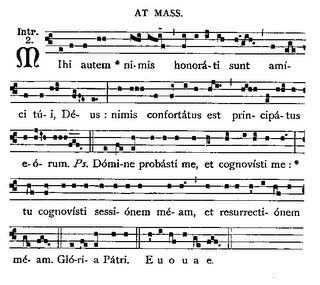Sermon on the Holy Name of Jesus, 2006
In the late nineteenth century a European diplomat serving in Egypt stumbled upon a rare find—a half-dozen ancient books. The style of the manuscripts’ ancient Greek handwriting suggested they had been written sometime between 100 and 400 A.D. Their great age and excellent condition made these books valuable, but when scholars turned their attention to the content of the writings they realized the find was one of a kind—and quite bizarre. The books contained paragraph after paragraph of nonsense words made up entirely of vowel sounds, strange sketches and occult diagrams, and—significantly—page after page of names. These were the names of gods and goddesses, angels and demons, mostly pagan names but even a few Jewish ones. The books contained dozens of magical spells! They were handbooks for ancient Greek magicians, teaching sorcerers how to harness the power of the supernatural for their paying clients. There were spells for good health, fair weather, and success in love or at the race track. There were curses upon one’s personal enemies, business rivals, and former lovers. And the keys to unlock all of this supernatural power, the magicians believed, were the names of gods and demons.
In the ancient Mediterranean world of Greece and Rome, magic was everywhere. It was believed that the power, the very essence of a being resided in its name. And knowledge of a supernatural name gave power. Magicians and common people alike assumed that if they could only learn the name of a god or a demon, they had a chance of manipulating the deity to serve their own purposes. Hence, the spells of ancient magicians often included dozens, even hundreds, of divine names. It was hoped that at least one of them would hit its target and force a supernatural being to bring about the goal of the spell.
Faithful Jews of that time did not routinely engage in pagan magic. They knew better than to try to strong arm the one, true God into doing their bidding with magical spells, and sorcery was punishable by death under the law of Moses. But ancient Jews shared the cultural assumptions of their Gentile neighbors about the power of divine names. The sacred name of the God of Abraham, Isaac and Jacob was a thing of immense power. Even though their Lord was “a God merciful and gracious, slow to anger, and abounding in steadfast love and faithfulness,” the law of Sinai spoke of dire consequences for those who “take the name of the Lord in vain” and fail to keep it holy. Misusing the four-letter Hebrew name of God, Yahweh, was dangerous. Even in antiquity Jews began substituting the Hebrew word adonai, “the Lord,” when they encountered God’s proper name as they read aloud. Better safe than sorry.
And yet here we are, as Christians, fearlessly speaking the name of God Incarnate, the Word made flesh, Christ Jesus. In fact, today is a special celebration of the most Holy Name of our Savior. It commemorates the day when, eight days after the boy’s birth as commanded in the Old Testament law, our Lord’s parents presented him for circumcision and He was formally given His name, Yeshua—“God’s saves,” which may be rendered in English as either Joshua or Jesus. “Jesus” was the name both the Blessed Virgin Mary and her betrothed, St. Joseph, had received by divine revelation nine months earlier. The child would be named Jesus, “for He will save His people from their sins.”
Yeshua is, of course, a noble name in the history of Israel. The first man to bear this name, a trusted aide of Moses and a mighty warrior, led Israel into the Promised Land and won a home for God’s people by the edge of the sword. But our Lord’s parents already knew that the baby boy they enrolled as a son of Israel by circumcision that day would be far greater than His Old Testament namesake. Mary’s Son would bear not only the name Jesus, but Immanuel—“God with us,” and He would be called “the Son of the Most High.” Eight centuries earlier the prophet Isaiah predicted this little boy would “be called Wonderful Counselor, Mighty God, Everlasting Father, Prince of Peace.” These were weighty names and titles, indeed, for such a tiny baby. Little wonder that Mary “treasured up these things in her heart,” too amazed even to speak.
Yet for all the exalted titles Christ bore, none is more meaningful than the Holy Name of Jesus itself. In this sacred name we see the whole of salvation history summarized in two words, “God saves.” From the day Adam and Eve were cast out of the Garden of Eden, God has been the One who saves. The hand of the Lord was at work in the ark of Noah and the ram sacrificed in Isaac’s place, in the parting of the Red Sea and the fall of the walls of Jericho, and in countless acts of deliverance throughout the history of Israel. But now as the Blessed Virgin presents her first-born son back to His heavenly Father with the awesome name “Jesus,” history has reached its turning point. The saving acts of God have reached their climax. Through this Jesus the blind will see, the deaf will hear, the lame will walk and the dead will the live again. And at the appointed time this Jesus will make atonement for sins by His own precious blood and put death to flight by the power of His resurrection. By Jesus God does save in very truth.
Unlike the empty and powerless names invoked by those pagan magicians so long ago on the banks of the Nile, the Holy Name of Jesus is truly a name of divine power. The demons of Hell are right to quake at the very mention of His name. The darkness has nowhere to hide from the Light that entered the world at Bethlehem. When confronted by the Truth incarnate—God’s saving power made flesh--the vaunted strength of the father of Lies proves feeble. And the day is coming, my brothers and sisters, when our Lord will make a footstool of Death, our final enemy, and the spiritual forces of wickedness that corrupt and destroy the creatures of God will join every other being in heaven, and on earth, and under the earth, bending knee in submission to the One whose name is above all names, Jesus the Christ. Holy is His name.
Beyond doubt, the name of Jesus is endowed with immense divine power. But to those who earnestly repent of their sins and turn to God in faithfulness the Savior’s Holy Name is a source of joy, not fear, for His divine name is also a human name. The Lord of all creation stooped down to take on our flesh and bone, our joys and sorrows, our frailty and our mortality. And He took a Name like our names: Jesus, son of Mary, of the household of David. Because of the Incarnation you and I may know God intimately—“on a first name basis,” so to speak. You and I may see God face to face and live, because He truly is one of us. And as our brother He calls each one of us by name. When Mary Magdalene was distraught beyond words at the disappearance of her Lord’s body on Easter morning, the risen Jesus soothed her aching heart and filled her with joy with just one word—her name, “Mary.” When Saul of Tarsus was struck down on his way to persecute the Church in Damascus, the risen Savior cut him to the quick by calling his name: “Saul, Saul. Why are you persecuting me?” Again and again in Holy Scripture and Sacred Tradition we find it, our Lord calling His saints by name to an intimate relationship with Him. And so they are recorded in the Lamb’s Book of Life: Mary Magdalene, servant and sister of Jesus; Paul the Apostle, servant and brother of Jesus. If you have turned to Christ in faith, receiving the healing waters of Holy Baptism and partaking of the Bread that came down from Heaven, your name is written there, too, alongside millions of other servants of His eternal Kingdom—the family of Jesus, those who truly know Him by name.
Let us pray that in the course of the Year of Our Lord 2006 we may all come to know more fully the One who bears a name at once both human and divine, and serve Him even more faithfully than we do today. Blessed be His Holy Name forever.
In the name of the Father, and of the Son, and of the Holy Spirit. Amen.








